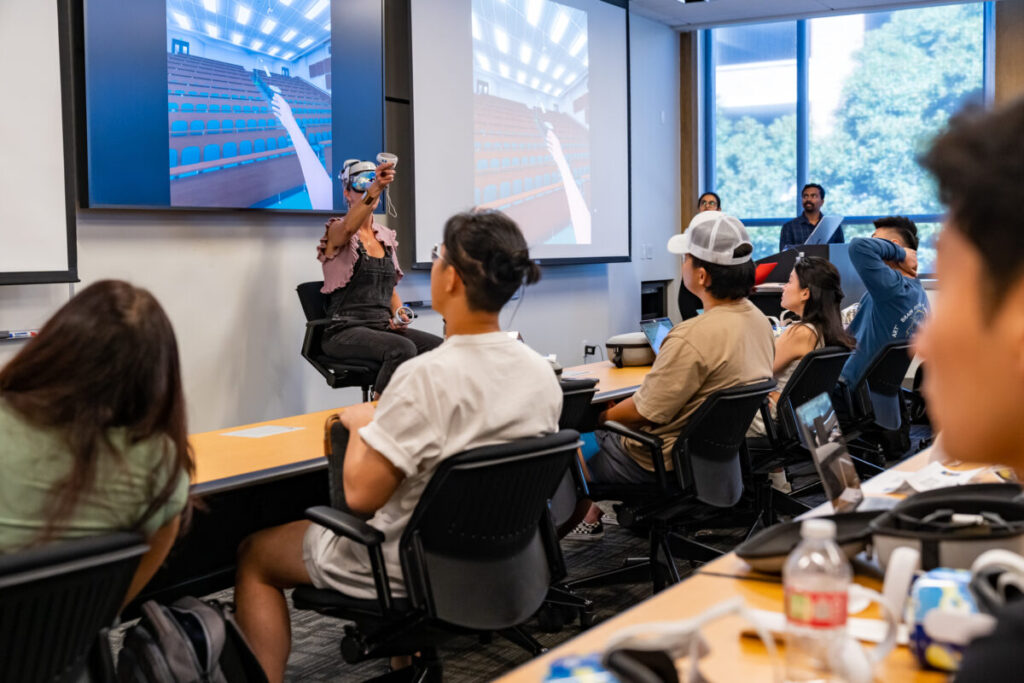UCI Goes Into The Metaverse

The University of California, Irvine is expanding its research efforts to the virtual realm.
OC’s second-largest university by student count has partnered with VictoryXR, an Iowa-based VR education startup, to turn UCI into a “metaversity.”
VirtualXR supplied UCI with a virtual twin build made on the EngageVR platform as part of the partnership, so students will now be able to attend class in an immersive virtual replica of the campus.
UCI celebrated the launch of the digital twin of the Paul Merage School of Business at a virtual ribbon-cutting ceremony on Nov. 2.
The digital twin will allow UCI to host more engagement opportunities for prospective students, international students and corporate partners, according to Ian Williamson, dean of the Merage School of Business.
“One vision that we have for this kind of technology is reaching beyond Irvine and California to provide access to UCI’s world-class education from anywhere in the world,” Williamson said during the ceremony.
The Irvine university is the sole school in the UC system to join VictoryXR’s Meta cohort, which are the first 15 universities in the U.S. to receive a digital twin metaversity and teach a class on the metaverse.
Meta Platforms Inc. (Nasdaq: META) announced last month that it would supply universities with $300 Meta Quest 2 headsets for the metaverse classes.
Backed by the Office of Data and Information Technology, UCI alumna Keri Albers—who graduated this year as a fellow—spearheaded the initiative at UCI and recruited business lecturer Larry Wilk to teach the class.
Into the Metaverse
“Into the Metaverse” began instruction this fall and is taught by Wilk, who has more than two decades of experience integrating new technologies at The Walt Disney Company.
The class expands on another class Wilk taught about the future of digital technology, focusing on the metaverse’s place in the evolving industry.
“I want the students to be in that same position when the next version of generative AI comes, they can develop a framework, assess the technology and figure out its value to the company,” Wilk told the Business Journal.
Students explore case studies within the metaverse and have even had the chance to present in front of guest speakers from different brands already implementing the metaverse such as Nike Inc., which teamed up with Roblox Corp. to create Nikeland, an immersive virtual environment modeled after Nike’s real headquarters with games and a digital showroom.
Albers was first approached by Tom Andriola, vice chancellor of information technology and data, to research how to integrate the metaverse into the classroom when she was still a data and technology fellow at UCI.
After Albers found out about VictoryXR’s metaversity initiative, she worked with multiple departments to get UCI into Meta’s cohort of universities and launch the metaverse class this fall.
Albers and Wilk worked with dean Williamson to make the class as accessible as possible.
All 40 enrolled students were provided with headsets at no cost from Meta. Albers also partnered with T-Mobile US Inc. to provide students with mobile hot spots to use at home if they don’t have sufficient Wi-Fi access.
Future of VR
The metaversity initiative was funded in part by the Meta Immersive Learning project, according to a VictoryXR press release.
Meta announced last year that it would invest $150 million to create 10 metaversities, but has now expanded to include five more universities.
Chief Executive Mark Zuckerberg rebranded Facebook to Meta in 2021, embracing the company’s shifting focus from social media to mixed virtual realities.
While Zuckerberg is betting on the metaverse being the future of technology, it continues to create losses for the company.
He announced on Oct. 25, 2021, that Meta planned to spend at least $10 billion on Reality Labs, the company’s metaverse division, to help make the metaverse the next big thing.
Facebook in 2014 paid $2.3 billion for Palmer Luckey’s Irvine-based Oculus VR in 2014, in one of its first moves for that effort.
Meta released its third-quarter earnings on Oct. 25, which reported a $3.7 billion loss for the Reality Labs division.
The company expects operating losses to increase well into 2024 due to “ongoing product development efforts,” according to the report.
Meta recently came out with its Quest 3 headset starting at $499.99 at the beginning of last month.
In the same month, Ray-Ban Meta smart glasses hit retail stores.
Meta collaborated with EssilorLuxottica Société anonyme to launch the collection featuring the first eyewear to have livestreaming and built-in Meta artificial intelligence.
Source link
#UCI #Metaverse





